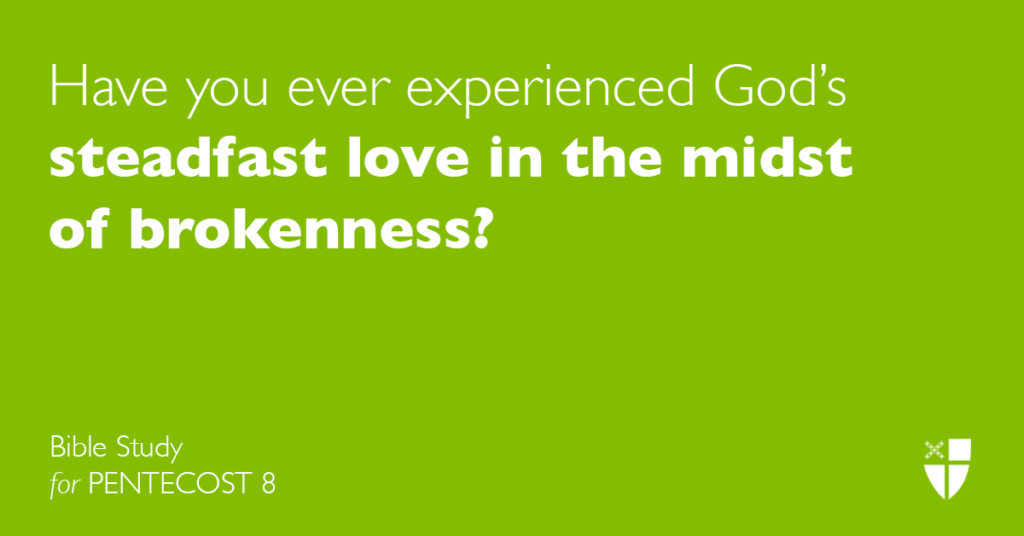Bible Study: Proper 11 (B) – 2021
July 18, 2021
RCL: 2 Samuel 7:1-14a; Psalm 89:20-37; Ephesians 2:11-22; Mark 6:30-34, 53-56

2 Samuel 7:1-14a
The David story is an exciting story, full of twists and turns – well worth reading in its entirety. Even though this chapter doesn’t have the guts, gore, and drama of other parts of the story, scholars and careful readers have noticed that this passage presents the theological apex of the whole narrative found in 1 and 2 Samuel. Here, God promises to make David’s name great (v. 9), to “plant” Israel peacefully in their land (v. 10), and to build David a “house” (v. 11).
Some commentators suggest a play on the double-meaning of “house” (Hebrew: bayit) here. Originally, David had wanted to build God a house (vv. 2 and 5)—i.e., a temple for the ark. Now, God uses the same word (“bayit”) spoken through the prophet Nathan to say he will build David a house (v. 11)—only God seems to mean a house of humans: a dynasty. He then makes promises about David’s “offspring,” whom God will “raise up” from the physical line of David and whose reign he will “establish” (v. 12). “He shall build a house for my name, and I will establish the throne of his kingdom forever. I will be a father to him, and he shall be a son to me” (vv. 13-14a).
- What stands out to you about this passage?
- In what ways does David’s “offspring” seem to refer to Solomon, and in what ways does the promise seem to come to full fruition in Jesus and in his church? Read John 2:13-22 aloud if time; see also 1 Corinthians 3:16-17.
Psalm 89:20-37
Psalm 89 as a whole is both a song of praise and an honest wrestling with God over how Israel’s history played out. This particular section sings of the promises God made to David in 2 Samuel 7 and reflects on them with faith and hope. It understands those promises as constituting a “covenant” (vv. 28 and 34) that God will not break. Other parts of the Scriptures seem to interpret the eventual disruption of the Davidic monarchy in 587 BCE as a result of God’s people’s failure to uphold their end of the covenant. But note verses 30-33: God says that if David’s descendants forsake the law—the way of life given to them as a gift by God—they will reap their own punishment, but even then, God “will not take” his chesed (mercy or steadfast love) from them, “nor let [his] faithfulness prove false” (v. 33). Elsewhere, one of God’s faithful people writes, “Even if we sin we are yours” (Wisdom 15:2), and the Psalmist sings, “Our sins are stronger than we are, but you will blot them out” (Psalm 65:3). Human sin and brokenness are never enough to stop God’s love and faithfulness.
- Are there any ways in which these promises of God ring true in your own life? Have you ever experienced God’s steadfast love in the midst of brokenness?
- Which verse speaks most to you in this psalm?
Ephesians 2:11-22
Through baptism into Christ, we become heirs of the “covenants of promise” (v. 12) and “members of the household of God” (v. 19). Everything promised to David and finally fulfilled in Jesus is granted also to us through our union with Jesus, begun in baptism and nourished and strengthened through holy communion. And in him, we are being built “into a holy temple in the Lord” (v. 21). God’s presence in the world, once specially concentrated in the ark of the covenant and housed in temple and tabernacle, is now in us (!) who are in Christ. Through the Holy Spirit, it is both already true and will become even more so what John the Revelator writes: “Behold, the dwelling place of God is with man. He will dwell with them, and they will be his people, and God himself will be with them as their God” (Revelation 21:3, ESV).
- How does the “temple” (v. 21) written about here compare to the one David had in mind?
- What does the cross (v. 16) have to do with it? If Jewish and Gentile Christians can be reconciled “in one body through the cross,” what does that mean for our situation of Christian division today?
Mark 6:30-34, 53-56
These verses of Mark’s gospel serve as a bookend for a “bread miracle” in which Jesus feeds five thousand people (vv. 35-44) and the episode that immediately follows in which Jesus walks on the sea (vv. 47-52). Taken together, Jesus’s invitation of the disciples into a “deserted place” (v. 31) followed by his miraculous provision of food and demonstration of power over the chaotic element of water all hearken back to Israel’s first wilderness wanderings with God (see Exodus 14 and 16). The comparison is no accident. The “many” (vv. 31 and 33) who are “like sheep without a shepherd” (v. 34) also figure importantly in these parts of the narrative. Twice we are told that the people “recognized” (vv. 33 and 54) Jesus, and far from ignoring or intently evading them, he has “compassion” on them, “teach[es] them many things” (v. 34), and heals them (v. 56).
- What do you think the people “recognize” in Jesus?
- What, if anything, can we glean from the people’s approach to Jesus and Jesus’ approach to the people?
- Does anything else stand out to you in this passage?
¡No olvide suscribirse al podcast Sermons That Work para escuchar este sermón y más en su aplicación de podcasting favorita! Las grabaciones se publican el jueves antes de cada fecha litúrgica.


